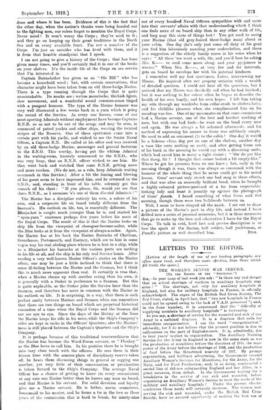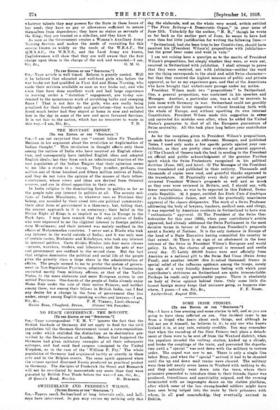LETTERS TO THE EDITOR.
[Letters of the length of one of our leading paragraphs are often more read, and therefore more effective, than those which fill treble the space.]
THE WOMAN'S SENIOR WAR SERVICE.
(To THE EDITOR or THE " SPECTATOR."] S1R,—In your issue of last week you ask: "Is there any real danger that an actual shortage of workers in auxiliary hospitals may arise ? " The shortage, not only for auxiliary hospitals in England, but also for military hospitals in France, is officially acknowledged. The organ of the British Red Cross Society, The Red Cross, stated, in April last, that " two new hospitals in France could not be opened owing to the lack of V.A.D. personnel"; and, in the June number, it is announced that the difficulty of supplying members to auxiliary hospitals" is increasing. As you say, a shortage of service for the wounded and sick of our Army is a national disgrace. It is a disgrace that calls for immediate reorganization. I use the word " reorganization " advisedly, for I do not believe that the present position is due to callousness on the part of Englishwomen. It is, admittedly, due to four years' neglect in organization. The Auxiliary Nursing Service for the Army in England is now in the same state as was the production of munitions before the disasters of 1915, the man- power of the Army before the shortage of 1916, and the production of food before the threatened scarcity of 1917. By prompt organization, and brilliant advertising, the Government created Auxiliary Women's Services for Munitions, for the Army, for the Navy, and for Food Production; and, in so doing, constructed a second line of defence safeguarding England and her Allies, in a great measure, from defeat. Is the Government waiting for a breakdown in the service of our sick and wounded, before organizing an Auxiliary Women's Service to meet the needs of the military and auxiliary hospitals ? Under the present chaotic conditions those needs will certainly increase. The women now serving the sick and wounded, under the British Red Cross Society, have no assured opportunity of making the best use of
whatever talents they may possess for the State in these hours of her need; they have no pay or allowances sufficient to assure themselves from dependence; they have no status as servants of the King; they are treated as a side-line, and they know it.
As soon as the Government creates a Woman's Auxiliary Army Nursing Service, and makes the needs of recruiting for this service known as widely as the needs of the W.R.A.F., the Q.M.A.A.C., the W.R.N.S., and the Land Army are known, Englishwomen will show that they are well aware that the first charge upon them is the charge of the sick and wounded.—I am,



























 Previous page
Previous page